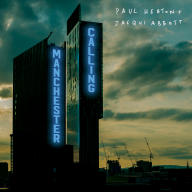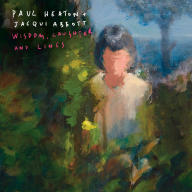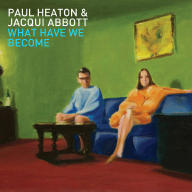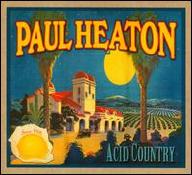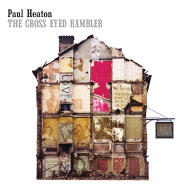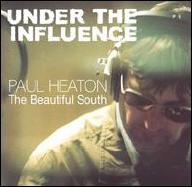Born in Bromborough in Merseyside, England in 1962, Paul David Heaton was raised in Sheffield from age four until the family moved to Surrey when he was in his early teens. It was there that he and his older brother Adrian formed their first band, Tools Down. At the time, he was still splitting his time between music and football, which he went on to play outside of school at the amateur level.
By his early twenties, he was based in Hull, where he formed the Housemartins with guitarist Stan Cullimore, bass player Ted Key, and drummer Chris Lang in 1984. A demo got them a record deal with Go! Discs. They released their first song, "Flag Day," in 1985 before Norman Cook (later known as Fatboy Slim) replaced Key on bass, and Hugh Whitaker of the Gargoyles briefly filled in for Lang until Dave Hemingway took over on drums. In 1986, the group made it to number three on the U.K. singles chart with their third single, "Happy Hour." Issued that October, their album London 0 Hull 4 also reached number three and hit the Top Ten in Norway and Sweden. Like contemporaries the Smiths, the Housemartins were college radio stars in the U.S., where their jangly riffs and brainy, humorous songs landed in the bottom half of the Billboard 200 with help from MTV airplay. The band's second album, 1987's The People Who Grinned Themselves to Death also reached the U.K. Top Ten and the lower tier of U.S. album chart.
After the Housemartins disbanded in 1988, Heaton and Hemingway formed the Beautiful South. The Beautiful South expanded Heaton's musical canvas, exploring jazz and even country influences with former Anthill Runaways vocalist Briana Corrigan, bassist Sean Welch, drummer David Stead (formerly a Housemartins roadie), and guitarist David Rotheray, who became Heaton's new songwriting collaborator. While many critics and student-run radio stations in the U.S. continued to laud Heaton's talent, the Beautiful South became far more successful in England. In the summer of 1989, they released their first single, "Song for Whoever," on the Housemartins' old record label, Go! "Song for Whoever" climbed to number two, while its follow-up, "You Keep It All In," peaked at number eight in September 1989. A month later, the group's debut, Welcome to the Beautiful South, was released and went to number two, eventually going platinum. The band's only number one single, "A Little Time," helped 1990's Choke replicate both sales feats, and their third LP, 0898, reached the Top Five behind three Top 30 singles. Following the release of 0898, Corrigan left the group and was replaced with Jacqui Abbott, who made her first appearance on the band's fourth straight Top Ten album, 1994's Miaow. It was followed at the end of the year by the greatest-hits collection Carry on Up the Charts, which entered the charts at number one. It stayed there for several months, going platinum many times over and, in the process, becoming one of the most popular albums in British history. The album wasn't released in America until late 1995, after it broke several U.K. records.
Two multi-platinum number one albums followed in the form of 1996's Blue Is the Colour and 1998's Quench before 2000's Painting It Red peaked at number two. Heaton issued a solo album under the alias Biscuit Boy (aka Crackerman) in 2001 that barely cracked the Top 100 before rejoining his band for 2003's Gaze. It didn't fare as well by their standards, though it still reached the U.K. Top 15. After a move to Sony, 2004's Golddiggas, Headnodders Pholk Songs hit number 11 with a set consisting mostly of covers. The Beautiful South's final album, Superbi, arrived in 2006, and while it reached number six on the album chart, it was their first to not be represented in the Top 40 of the singles chart.
The group called it quits in 2007, having sold more than 15 million records worldwide, and Heaton shifted his focus to his solo career. He released 2008's The Cross Eyed Rambler under his own name. Two years later, Heaton returned with Acid Country, which he helped to promote with a bicycle-led U.K. pub tour. The year 2012 saw the release of Presents the 8th, a stage play that boasted a single conceptual song told in eight chapters, dealing with the seven deadly sins, and featuring guest vocalists. In 2014, he released What Have We Become?, a collaborative album recorded with the Beautiful South's Jacqui Abbott. After the warm reception of that effort, which catapulted to number three on the U.K. albums chart, the duo regrouped for 2015's Wisdom, Laughter and Lines. The success of their renewed partnership was also reflected in an extensive and well-received set of live dates, culminating in a sold-out homecoming gig to a crowd of 20,000 in Hull in 2017. That same year, Heaton and Abbott released their third record as a duo, Crooked Calypso, which was produced by longtime collaborator John Williams (Cocteau Twins, Alison Moyet). The year 2018 brought the career-spanning The Last King of Pop, a 23-track collection representing both of Heaton's beloved bands, solo material, and his partnership with Abbott. It peaked at number ten on the album chart. The pair returned with the Williams-produced Manchester Calling in March 2020. Conceived as a double album in the fashion of the Clash's London Calling, the slightly abbreviated 16-track set topped the album chart in the U.K. They headed back to the studio with Williams and their established backing band (guitarist Jonny Lexus, bassist Chris Wise, drummer Pete Marshall, and keyboardist Stephen Large) for 2022's N.K. Pop. ~ Marcy Donelson & Stephen Thomas Erlewine, Rovi


